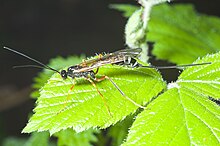Acaenitinae is a subfamily of the parasitoid wasp family Ichneumonidae. Female Acaenitinae have a large triangular projecting genital plate.[1]
| Acaenitinae | |
|---|---|

| |
| Coleocentrus excitator | |
| Scientific classification | |
| Domain: | Eukaryota |
| Kingdom: | Animalia |
| Phylum: | Arthropoda |
| Class: | Insecta |
| Order: | Hymenoptera |
| Family: | Ichneumonidae |
| Subfamily: | Acaenitinae Förster, 1869 |
Distribution
editIt is distributed on all continents except Antarctica, although only one specimen (from the genus Arotes) has ever been discovered in South America.[2]
Taxonomy and phylogeny
editThe subfamily has traditionally been divided into two tribes (Acaenitini and Coleocentrini) and comprises 28 genera.[3][4] The validity of tribes remains debated. Wahl and Gauld considered Coleocentrini paraphyletic and favored abandoning a tribal arrangement in 1998.[2] In contrast, Klopfstein et al. and Bennett et al. found Acaenitini to be monophyletic in 2019. However, they also found that Coleocentrus, the type genus of Coleocentrini, was not recovered as sister to Acaenitini.[1]
Genera
editAcaenitini Förster, 1869
edit- Acaenitus Latreille, 1809[5]
- Arotes Gravenhorst, 1829[6]
- Asperpunctatus Wang, 1989
- Boloderma Morley, 1913
- Dentifemura Sheng and Sun, 2010
- Dimorphonyx Seyrig, 1932
- Hieroceryx Tosquinet, 1896
- Ishigakia Uchida, 1928[7]
- Jezarotes Uchida, 1928[7]
- Metachorischizus Uchida, 1928[7]
- Notaulites Seyrig, 1932
- Paracollyria Cameron, 1906
- Phaenolobus Förster, 1869[6]
- Phalgea Cameron, 1905[8]
- Phorotrophus Saussure, 1892
- Prosacron Townes, 1971
- Siphimedia Cameron, 1902
- Spilopteron Townes, 1965[9]
- Yamatarotes Uchida, 1929[7]
- Yezoceryx Uchida, 1928[7]
Coleocentrini Clément, 1938
edit- Coleocentrus Gravenhorst, 1829[6]
- Cumatocinetus Sheng 2002,
- Eremocinetus Viktorov, 1964
- Hallocinetus Viktorov, 1962
- Leptacoenites Strobl, 1902[5]
- Mesoclistus Förster, 1869[5]
- Procinetus Förster, 1869[5]
Incertae sedis
editReferences
edit- ^ a b Bennett, Andrew M.R.; Cardinal, Sophie; Gauld, Ian D.; Wahl, David B. (2019). "Phylogeny of the subfamilies of Ichneumonidae (Hymenoptera)". Journal of Hymenoptera Research. 71: 1–156. doi:10.3897/jhr.71.32375.
- ^ a b Castillo, C., Sääksjärvi, I. E., Bennett, A. M., & Broad, G. R. (2011). First record of Acaenitinae (Hymenoptera, Ichneumonidae) from South America with description of a new species and a key to the world species of Arotes Gravenhorst. ZooKeys, (137), 77.
- ^ Sheng, M-l.; Sun, S-p. (2010). "A new genus and species of Acaenitini (Hymenoptera, Ichneumonidae, Acaenitinae) from China". ZooKeys (49): 87–93. Bibcode:2010ZooK...49...87S. doi:10.3897/zookeys.49.408.
- ^ a b Sheng, Mao-Ling; Sun, Shu-Ping (2014). "Combivena gen.n (Hymenoptera: Ichneumonidae: Acaenitinae) from China". Journal of Insect Science. 14: 158. doi:10.1093/jisesa/ieu020. PMC 5443596. PMID 25347843.
- ^ a b c d Kolarov, Janko (2019). "Catalogue of the Bulgarian Ichneumonidae (Hymenoptera: Insecta)". Journal of National Park Research. 10 (1): 1–181.
- ^ a b c Varga, A (2013). "A review of the subfamily Acaenitinae Förster, 1869 (Hymenoptera, Ichneumonidae) from Ukrainian Carpathians". Biodiversity Data Journal. 1 (1): e1008. doi:10.3897/BDJ.1.e1008. PMC 3964695. PMID 24723751.
- ^ a b c d e Pham, Nhi Thi; Ito, Masato; Matsumoto, Rikio; van Achterberg, Kees (2018). "Two new species of the genus Ishigakia (Hymenoptera: Ichneumonidae, Acaenitinae) from Vietnam based on morphological and molecular evidence". Zootaxa. 4442 (4): 539–550. doi:10.11646/zootaxa.4442.4.3. PMID 30313950.
- ^ Pham, Nhi Thi; Van Achterberg, Kees (14 April 2015). "A review of the genus Phalgea Cameron (Hymenoptera: Ichneumonidae: Acaenitinae) with description of a new species from Vietnam". Zootaxa. 3947 (1): 146–150. doi:10.11646/zootaxa.3947.1.11. PMID 25947726.
- ^ Ito, Masato; Maeto, Kaoru (5 October 2017). "Revision of the genus Spilopteron Townes, 1965 (Hymenoptera: Ichneumonidae: Acaenitinae) from Japan". European Journal of Taxonomy (356). doi:10.5852/ejt.2017.356. Retrieved 19 September 2023.
Further reading
edit- Townes, H.K. (1971) Genera of Ichneumonidae, Part 4 (Cremastinae, Phrudinae, Tersilochinae, Ophioninae, Mesochorinae, Metopiinae, Anomalinae, Acaenitinae, Microleptinae, Orthopelmatinae, Collyriinae, Orthocentrinae, Diplazontinae). Memoirs of the American Entomological Institute 17: 1–372.
External links
edit